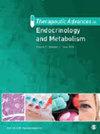延缓2型糖尿病患者糖尿病肾病进展的药物治疗:过去、现在和未来
IF 3.9
3区 医学
Q2 ENDOCRINOLOGY & METABOLISM
Therapeutic Advances in Endocrinology and Metabolism
Pub Date : 2022-01-01
DOI:10.1177/20420188221081601
引用次数: 9
摘要
糖尿病肾病(DKD)是糖尿病患者发病率和死亡率的主要原因,也是世界范围内终末期肾病的最重要原因之一。为了减少DKD的进展,重要的管理目标包括治疗高血压、血糖和控制心血管风险因素,如脂质、饮食、吸烟和锻炼。血管紧张素转换酶抑制剂或血管紧张素受体阻滞剂的使用在预防DKD进展方面具有既定作用。许多其他药物,如内皮素-1受体拮抗剂和巴多唑酮,结果令人失望。然而,最近的研究表明,新的抗糖尿病药物,如钠-葡萄糖转运蛋白-2抑制剂(SGLT-2i)和胰高血糖素样肽-1类似物,对DKD患者具有特定的有益作用。事实上,最近的指导意见表明,无论血糖控制如何,SGLT-2i药物都应在DKD早期使用。DKD的发展和进展有许多途径被假设,并开辟了一些新的潜在治疗靶点。本文旨在讨论DKD的管理,包括过去的开创性试验、为当前提供信息的最近试验以及未来可能提供的潜在新治疗方案。本文章由计算机程序翻译,如有差异,请以英文原文为准。
Pharmacotherapy to delay the progression of diabetic kidney disease in people with type 2 diabetes: past, present and future
Diabetic kidney disease (DKD) is a leading cause of morbidity and mortality among people living with diabetes, and is one of the most important causes of end stage renal disease worldwide. In order to reduce progression of DKD, important management goals include treatment of hypertension, glycaemia and control of cardiovascular risk factors such as lipids, diet, smoking and exercise. Use of angiotensin converting enzyme inhibitors or angiotensin receptor blockers has an established role in prevention of progression of DKD. A number of other agents such as endothelin-1 receptor antagonists and bardoxolone have had disappointing results. Recent studies have, however, suggested that newer antidiabetic agents such as sodium-glucose transporter-2 inhibitors (SGLT-2i) and glucagon-like peptide-1 analogues have specific beneficial effects in patients with DKD. Indeed most recent guidance suggest that SGLT-2i drugs should be used early in DKD, irrespective of glucose control. A number of pathways are hypothesised for the development and progression of DKD, and have opened up a number of newer potential therapeutic targets. This article aims to discuss management of DKD with respect to seminal trials from the past, more recent trials informing the present and potential new therapeutic options that may be available in the future.
求助全文
通过发布文献求助,成功后即可免费获取论文全文。
去求助
来源期刊

Therapeutic Advances in Endocrinology and Metabolism
Medicine-Endocrinology, Diabetes and Metabolism
CiteScore
7.70
自引率
2.60%
发文量
42
审稿时长
8 weeks
期刊介绍:
Therapeutic Advances in Endocrinology and Metabolism delivers the highest quality peer-reviewed articles, reviews, and scholarly comment on pioneering efforts and innovative studies across all areas of endocrinology and metabolism.
 求助内容:
求助内容: 应助结果提醒方式:
应助结果提醒方式:


